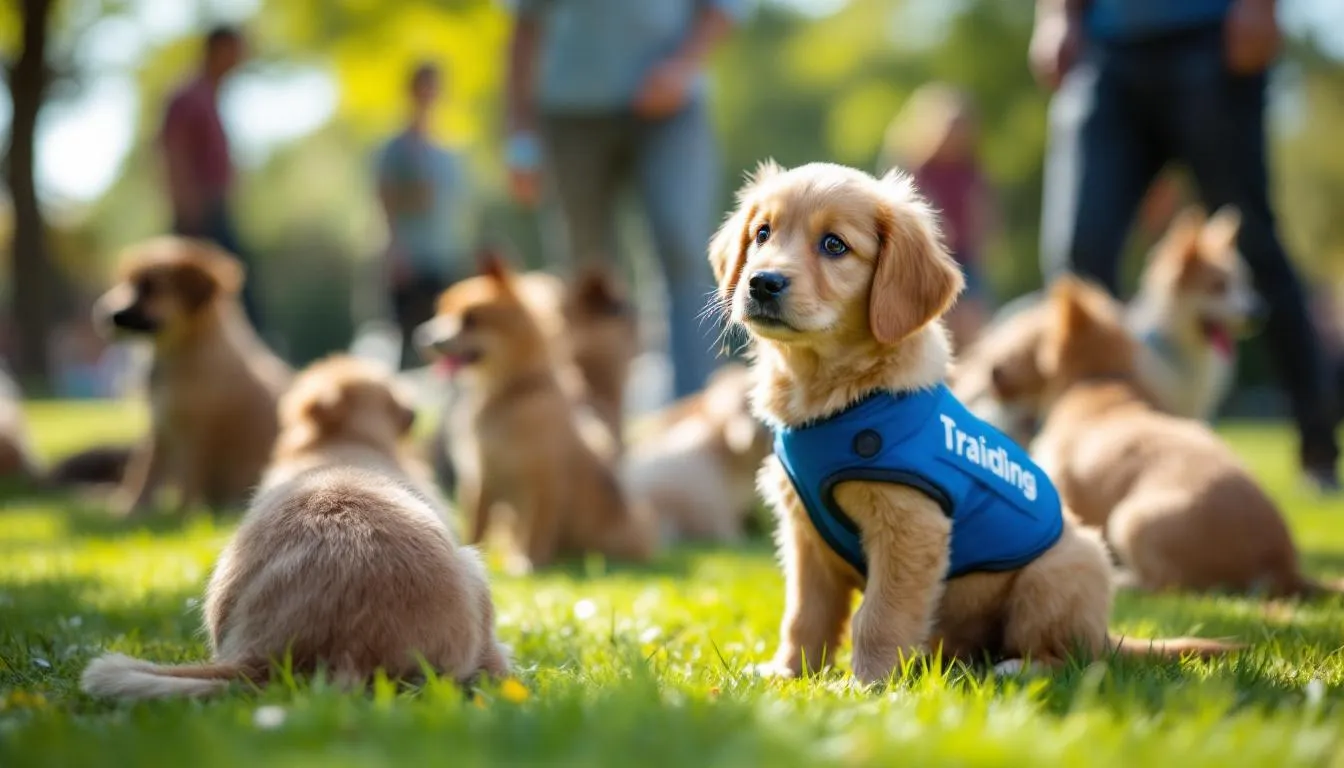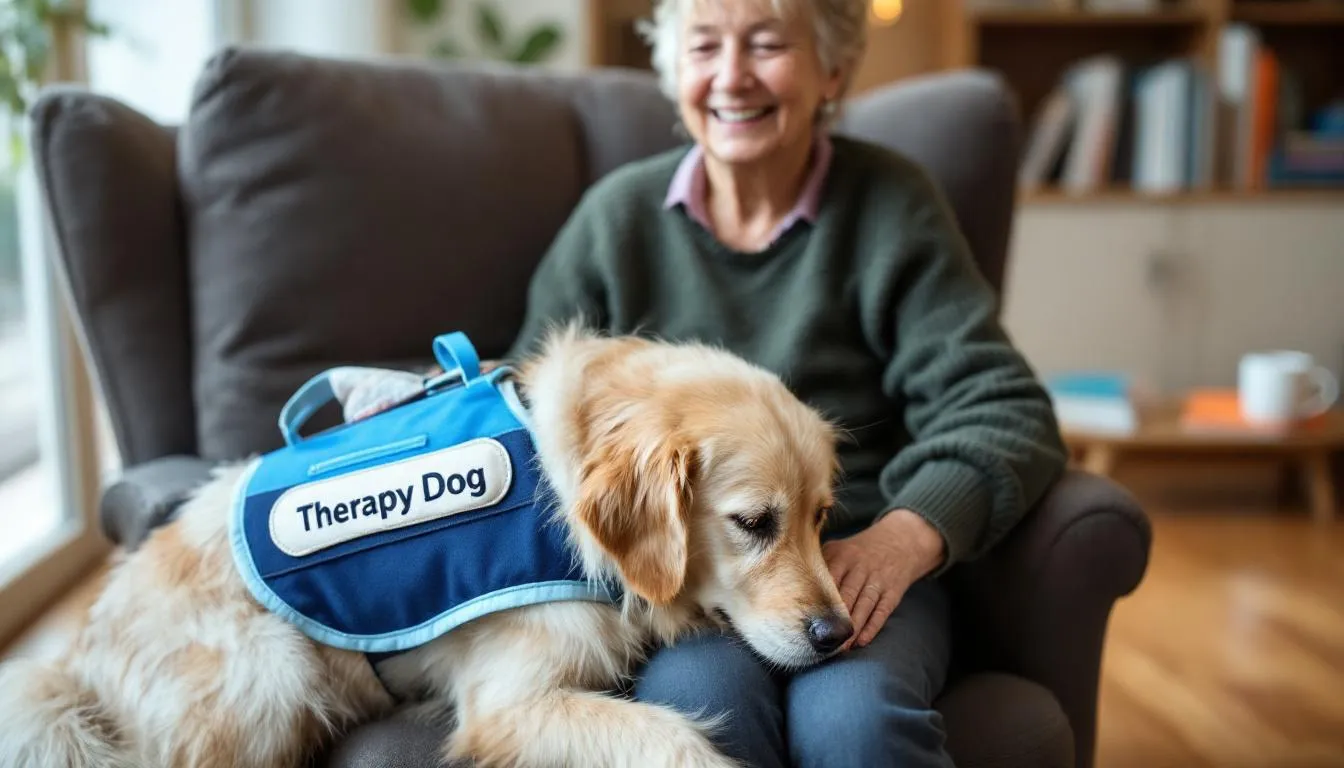Key Takeaways
- Mini golden doodles are a crossbreed between miniature poodles and golden retrievers, typically weighing 15-35 pounds
- They feature hypoallergenic, low-shedding coats making them ideal for families with allergies
- These intelligent, friendly dogs excel as family pets and therapy animals due to their gentle temperament
- Prices range from $2,000-$2,500 from reputable breeders with proper health testing
- Regular grooming and exercise are essential for maintaining their health and beautiful coat
Mini golden doodles are a crossbreed between miniature poodles and golden retrievers, typically weighing 15-35 pounds
They feature hypoallergenic, low-shedding coats making them ideal for families with allergies
These intelligent, friendly dogs excel as family pets and therapy animals due to their gentle temperament
Prices range from $2,000-$2,500 from reputable breeders with proper health testing
Regular grooming and exercise are essential for maintaining their health and beautiful coat
Finding the perfect family pet means balancing size, temperament, and care requirements with your lifestyle. The mini golden doodle has emerged as an excellent choice for families seeking a smaller, intelligent companion that fits comfortably in various living situations. This carefully bred crossbreed combines the gentle nature of golden retrievers with the hypoallergenic qualities of miniature poodles, creating an affectionate furry friend that works well for allergy sufferers and busy families alike.
Whether you’re a first-time dog owner or adding to your pack, understanding what makes mini goldendoodles special will help you decide if this breed matches your family’s needs. From their manageable size to their eager-to-please personality, these dogs offer companionship without overwhelming your space or schedule.


What is a Mini Golden Doodle?
A mini golden doodle represents a deliberate cross between a golden retriever and a miniature poodle, creating a designer dog breed that’s gained tremendous popularity since the 1990s. Miniature goldendoodles are a specific breed resulting from crossing a miniature poodle and a golden retriever, known for their intelligence, low-shedding coats, and suitability as family-friendly pets. Unlike traditional purebreds recognized by the american kennel club, this mixed breed combines the best characteristics from both parent breeds to create an ideal family pet.
These compact companions typically stand 14-17 inches tall and weigh between 15-35 pounds when fully grown. Their smaller stature makes them perfect for apartment living while maintaining the friendly disposition that golden retrievers are famous for. The size can vary depending on whether the poodle parent was a miniature or toy variety, as the parent breeds are crossed to produce mini golden doodles, giving families options that fit their specific space requirements.
The popularity of mini goldendoodles stems from their ability to offer the intelligence and trainability of poodles alongside the gentle, family-oriented nature of golden retrievers. This combination creates dogs that are both manageable in size and exceptional in temperament, making them sought-after pets for modern families.
Mini Golden Doodle Generations Explained
Understanding generations helps predict what traits your new puppy might inherit and how hypoallergenic they’re likely to be. Each generation offers different characteristics that may better suit specific family needs.
F1 Generation represents the direct cross between a golden retriever and miniature poodle, resulting in a 50/50 genetic split. These first-generation crosses often display the most variation in coat type and shedding, though they benefit from hybrid vigor that can reduce health issues common in the parent breeds.
F1B Generation occurs when an F1 mini golden doodle is bred back to a poodle, creating offspring that are 75% poodle and 25% golden retriever. This generation typically produces more consistent hypoallergenic coats and reduced shedding, making them particularly appealing for families with allergies.
F1BB Generation takes the process further, breeding an F1B back to another poodle to achieve 87.5% poodle genetics. These dogs usually have the curliest, most non shedding coats but may lose some of the golden retriever’s characteristic temperament traits.
Multigen goldendoodles result from breeding two mini goldendoodles together across multiple generations. While they offer more predictable traits, the specific characteristics will vary depending on the parent dogs’ lineage and the breeder’s selection focus.
The generation you choose should align with your priorities. Families prioritizing minimal shedding might prefer F1B or higher generations, while those wanting a balance of traits from both breeds might find F1 generations more appealing. Doing thorough research on each generation can help families make informed decisions about which option best fits their needs.
Golden Retriever Heritage
The golden retriever is renowned for its friendly, loyal, and intelligent nature—qualities that have made it one of the most beloved dog breeds worldwide. As one of the parent breeds of the mini goldendoodle, the golden retriever brings a wealth of positive traits to this popular crossbreed. Known for their affectionate nature and eagerness to please, golden retrievers have long been celebrated as ideal family pets, excelling in homes with children and other pets alike.
When breeders set out to create the mini goldendoodle, they specifically sought to capture the golden retriever’s gentle temperament and social personality. These dogs are naturally outgoing, making them excellent companions for families who value a dog that thrives on interaction and play. The golden retriever’s intelligence also contributes to the mini goldendoodle’s trainability, ensuring that these dogs are not only loving but also quick to learn and eager to participate in family activities.
By blending the golden retriever’s best qualities with those of the miniature poodle, breeders have created a dog breed that embodies the affectionate, loyal, and adaptable spirit of its golden heritage—making the mini goldendoodle a perfect companion for families seeking a loving and intelligent furry friend.
Miniature Goldendoodle Size
One of the standout features of the miniature goldendoodle is its perfectly balanced size, which makes it an excellent choice for a wide range of families and living situations. Mini goldendoodles are carefully bred by crossing a golden retriever with a miniature poodle, resulting in a dog that is smaller than the standard goldendoodle but still sturdy and playful.
Typically, a fully grown mini goldendoodle will weigh between 15 and 35 pounds and stand about 14 to 17 inches tall at the shoulder. This size can vary depending on the specific breeding pair, with some litters leaning toward the smaller or larger end of the spectrum. Compared to standard goldendoodles, which can weigh up to 90 pounds, the miniature variety is much more manageable for apartment dwellers, families with young children, or those who prefer a medium-sized dog that’s easy to handle.
The compact size of the mini goldendoodle means they fit comfortably into most homes and lifestyles, whether you have a spacious backyard or a cozy city apartment. Their moderate build allows them to join in on family adventures, travel with ease, and enjoy playtime without overwhelming smaller children or other pets. When choosing a mini goldendoodle, it’s important to discuss size expectations with your breeder, as the final size can vary depending on the genetics of the parent dogs.


Physical Characteristics
Mini goldendoodles offer an appealing package in a compact size that works well for various living situations. Their proportionate body structure maintains the athletic build of both parent breeds while staying small enough for comfortable indoor living. Mini goldendoodles are prone to matting if not regularly groomed, so consistent coat care is important.
Weight ranges from 15-35 pounds, with most adults settling in the 20-30 pound range. This makes them substantial enough to play with children safely while remaining light enough for easy handling during grooming or veterinary visits. Their height typically measures 14-17 inches at the withers, creating a dog that’s not too small to accidentally step on but won’t overwhelm your furniture or car space.
The compact build doesn’t sacrifice athleticism. These dogs maintain the energy and coordination needed for hiking, swimming, and active play while fitting comfortably in apartments or smaller homes. Mini goldendoodles especially enjoy playing with children and toys, both indoors and outdoors. Their size makes them excellent travel companions and allows them to navigate various environments with confidence.
Coat Types and Colors
The coat represents one of the most distinctive features of mini goldendoodles, with genetics determining both texture and maintenance requirements. Three main coat types exist: straight, wavy, and curly, each offering different benefits and care needs.
Straight coats resemble the golden retriever parent more closely and typically shed more than other varieties. While they require less intensive grooming, they may not be ideal for families seeking hypo allergenic pets.
Wavy coats provide the most popular middle ground, offering reduced shedding with manageable grooming requirements. These coats often have a soft, flowing texture that’s appealing to touch and creates the classic “teddy bear” appearance many families love.
Curly coats most closely resemble the poodle parent and offer the highest level of hypoallergenic qualities. They require the most maintenance but provide the best option for allergy sufferers seeking a mini goldendoodle.
Color variations include cream, gold, red, chocolate, black, and various parti-color combinations. Special patterns like merle, phantom, and tuxedo markings add visual interest, though responsible breeders carefully manage breeding to avoid genetic issues associated with certain color combinations.
The furnishings gene affects facial hair growth and overall coat density. Dogs with furnishings typically have the characteristic “doodle” appearance with facial hair and eyebrows, while those without may look more like golden retrievers with shorter facial hair.
Mini Goldendoodles Hypoallergenic Properties
For many families, allergies can be a major concern when choosing a new puppy. Mini goldendoodles are often celebrated for their hypoallergenic qualities, making them a top choice for allergy sufferers who still want the joy of a family pet. While no dog breed is completely hypoallergenic, mini goldendoodles are carefully bred to minimize shedding and dander, thanks to the influence of their miniature poodle parent.
The unique coat of the mini goldendoodle—especially in wavy or curly varieties—helps trap loose hair and dander, reducing the amount released into the environment. This non shedding characteristic is a significant advantage for those sensitive to pet allergens. Regular brushing and grooming are essential to maintain these hypoallergenic properties, as they help control loose hair and keep the coat healthy.
It’s important to note that individual reactions to dogs can vary depending on the person and the specific dog’s coat type. Spending time with a mini goldendoodle before bringing one home is a smart way to ensure compatibility. For families seeking a hypoallergenic, low-shedding companion, mini goldendoodles offer an excellent balance of beauty, comfort, and allergy-friendly living.
Temperament and Personality
Mini goldendoodles consistently demonstrate the gentle, patient nature that makes them exceptional family companions. Their temperament combines the best aspects of both parent breeds, creating dogs that are naturally drawn to human companionship and excel in family environments.
Intelligence ranks among their strongest traits, inherited from both poodles and golden retrievers. This makes them highly trainable and eager to learn new skills, whether basic obedience or more complex tasks. Mini goldendoodles are easy to train, responding exceptionally well to positive reinforcement training methods, and often surprise owners with how quickly they master new commands.
Their friendly, social personality makes them excellent with children of all ages. They typically show patience with toddlers while maintaining enough energy to keep up with active older kids. Most mini goldendoodles naturally regulate their play style based on their human companions, being gentle with small children and more energetic with teenagers.
The affectionate nature of these dogs means they thrive on attention and interaction. They’re not typically suited for families that are away for long periods, as they can develop separation anxiety. However, their adaptable personality allows them to adjust to various family schedules when properly socialized and trained.
Their eager-to-please attitude makes them responsive to training and household rules. Unlike some breeds that can be stubborn or independent, mini goldendoodles generally want to make their families happy and will work to understand expectations.
Hybrid Vigor
One of the key advantages of choosing a mini goldendoodle is the benefit of hybrid vigor—a phenomenon seen in mixed breeds where crossing two distinct purebred lines can result in healthier, more robust offspring. By combining the genetics of the golden retriever and the miniature poodle, breeders aim to create puppies that inherit the best qualities of both parent breeds while reducing the risk of certain inherited health issues.
Hybrid vigor often leads to improved immune function, greater resilience, and a lower likelihood of developing some of the genetic conditions that can affect purebred dogs. This means that mini goldendoodles, as a crossbreed, may enjoy better overall health and vitality compared to some other breeds. However, it’s still essential to choose a reputable breeder who carefully selects healthy parent dogs and follows responsible breeding practices to maximize these benefits.
For families seeking a healthy, energetic, and well-balanced family pet, the hybrid vigor of the mini goldendoodle offers peace of mind and the promise of a happy, active companion for years to come.


Health Considerations
Mini goldendoodles benefit from hybrid vigor, which can reduce the likelihood of inherited health issues common in purebred dogs. However, they can still be affected by conditions present in both parent breeds, making health testing of breeding dogs essential.
Common health concerns include hip dysplasia, which can affect mobility and comfort as dogs age. Progressive retinal atrophy and other eye conditions may also occur, though responsible breeding with health-tested parents significantly reduces these risks. Heart issues and luxating patella represent additional concerns that vary depending on the genetic lines involved.
The expected lifespan ranges from 12-15 years with proper care, which compares favorably to many other breeds. Regular veterinary checkups, maintaining healthy weight, and providing appropriate exercise contribute to longevity and quality of life.
Choosing a mini goldendoodle breeder who health tests all breeding dogs for hips, elbows, heart, eyes, and patella provides the best foundation for a healthy puppy. Reputable breeders will gladly share health testing results and discuss the health history of their breeding lines.
Prevention through proper care plays a crucial role in maintaining health. This includes regular dental care, such as brushing your dog's teeth to maintain dental health and prevent infections, appropriate nutrition, consistent exercise, and staying current with vaccinations and parasite prevention as recommended by your veterinarian.
Enhanced Health and Longevity
Thanks to the combination of hybrid vigor and responsible breeding, mini goldendoodles are known for their enhanced health and impressive longevity. With proper care, these dogs often enjoy a lifespan of 12 to 15 years, making them a long-term addition to any family. Their mixed breed heritage helps reduce the risk of some common health issues seen in golden retrievers and miniature poodles, such as hip dysplasia and certain eye conditions.
To ensure your mini goldendoodle remains healthy throughout its life, it’s essential to provide regular veterinary checkups, a balanced diet, and plenty of exercise. Preventive care, such as routine vaccinations, dental hygiene, and parasite control, also plays a crucial role in supporting their well-being. Choosing a breeder who prioritizes health testing and responsible breeding practices further increases the likelihood of bringing home a robust, healthy puppy.
By investing in proper care and selecting a mini goldendoodle from a reputable breeder, families can look forward to many years of joyful companionship, playful adventures, and unwavering loyalty from their furry friend.


Care and Maintenance
Daily care for mini goldendoodles focuses on maintaining their coat, providing adequate exercise, and meeting their mental stimulation needs. Their intelligence and energy require consistent attention to prevent boredom and destructive behaviors.
Daily brushing prevents matting and tangles, particularly important for wavy and curly coat types. Working in sections ensures you don’t miss areas behind the ears, under the collar, or around the legs where mats commonly form. A slicker brush and metal comb provide the basic tools needed for regular brushing maintenance.
Professional grooming every 6-8 weeks keeps coats healthy and manageable. The frequency may vary depending on coat type and personal preference for length. Many owners rely on professional groomers for regular maintenance, as grooming services typically include nail clipping and bathing to keep the dog’s coat clean and tidy. Many owners choose to maintain shorter “puppy cuts” for easier maintenance, while others prefer longer styles that showcase the coat’s natural beauty.
Exercise needs include 30-60 minutes of moderate daily activity, which can be split into multiple sessions. Two walks combined with yard play or indoor activities typically meet their physical requirements. Mental stimulation through training, puzzle toys, or interactive games helps satisfy their intelligent minds.
Dental care, nail trimming, and ear cleaning form essential parts of routine maintenance. Regular brushing prevents dental issues, while keeping nails short protects floors and prevents discomfort. Checking and cleaning ears weekly helps prevent infections, particularly important given their floppy ear structure.
Training and Socialization
Early socialization during the puppy development period creates confident, well-adjusted adult dogs. Exposing puppies to various people, sounds, surfaces, and experiences in positive ways builds the foundation for lifelong adaptability.
Basic obedience training using positive reinforcement methods works exceptionally well with mini goldendoodles. Their eager-to-please nature means they respond quickly to consistent, reward-based training. Starting with essential commands like sit, stay, come, and down provides the foundation for more advanced training.
Crate training serves multiple purposes, from housebreaking assistance to providing a safe space during travel or vet visits. Most mini goldendoodles adapt well to crate training when introduced gradually with positive associations like treats and comfortable bedding.
Puppy classes offer structured socialization opportunities while teaching basic manners. The combination of controlled exposure to other dogs and professional guidance helps ensure proper development during critical learning periods.
House training typically progresses smoothly with consistent schedules and positive reinforcement. Most mini goldendoodles are naturally clean and want to please their families, making the process more straightforward than with some other breeds.
Living Requirements
Mini goldendoodles adapt well to various living situations, making them suitable for both apartments and houses with yards. Their moderate size and adaptable nature allow them to thrive in urban, suburban, or rural environments.
Indoor space requirements are modest compared to larger breeds. They need room to move around comfortably and space for toys and bedding, but they don’t require expansive indoor areas. A comfortable sleeping area, access to water, and space for food bowls typically meet their basic indoor needs.
Outdoor access enhances their quality of life but isn’t absolutely essential for apartment dwellers. Taking your mini goldendoodle for a daily walk is important for their exercise, socialization, and overall well-being. Regular walks and occasional trips to dog parks can substitute for private yard access. When yards are available, secure fencing prevents wandering and provides safe space for off-leash play.
Climate adaptability varies depending on coat type and individual tolerance. Their coats provide some protection from weather, but extreme temperatures require appropriate precautions. Summer heat may require limiting outdoor activity during peak hours, while winter cold might necessitate protective clothing for some individuals.
Compatibility with other pets is generally excellent when proper introductions are made. Mini goldendoodles typically get along well with cats, other dogs, and various household pets. Their gentle nature and social tendencies make them good candidates for multi-pet households.
Finding a Reputable Breeder
Selecting the right mini goldendoodle breeder significantly impacts your puppy’s health, temperament, and long-term wellbeing. Reputable breeders focus on producing healthy, well-socialized puppies rather than simply maximizing profit.
GANA (Goldendoodle Association of North America) certification provides one indicator of breeder commitment to ethical practices. Certified breeders agree to health testing requirements and follow established guidelines for breeding practices.
Essential health testing includes screening breeding dogs for hip dysplasia, elbow dysplasia, heart conditions, eye problems, and patellar luxation. Responsible breeders will readily provide test results and discuss the health history of their breeding lines. They should also be knowledgeable about the genetic factors that influence coat type and shedding.
Red flags to avoid include breeders who won’t allow facility visits, can’t provide health testing documentation, have multiple litters available constantly, or seem primarily focused on quick sales rather than matching puppies to appropriate families.
Questions to ask potential breeders should cover health testing, socialization practices, return policies, and ongoing support. Good breeders often want to maintain relationships with puppy families and will offer guidance throughout the dog’s life.
Price ranges from $2,000-$2,500 for quality mini goldendoodles from reputable breeders, though prices may vary based on location, lineage, and specific characteristics. While the initial cost represents a significant investment, choosing a responsible breeder often saves money and heartache in the long term through reduced health and behavioral issues.


Mini Golden Doodle as Service and Therapy Dogs
The natural temperament and intelligence of mini goldendoodles make them excellent candidates for therapy and service work. Their gentle disposition, combined with their manageable size, creates opportunities for specialized training that benefits both the dogs and the people they serve.
Therapy work comes naturally to many mini goldendoodles due to their calm, affectionate nature and desire to please. They often excel in visiting hospitals, nursing homes, schools, and other facilities where their presence provides comfort and emotional support. Their size makes them less intimidating than larger breeds while being substantial enough to provide meaningful interaction.
Canine Good Citizen certification provides a foundation for therapy work, demonstrating basic obedience and social skills. Many mini goldendoodles easily achieve this certification, opening doors to Therapy Dogs International or similar organizations that facilitate therapy visits.
Service dog training represents a more specialized path that requires extensive preparation and assessment. While not all mini goldendoodles are suited for service work, those with the right temperament and drive can excel in roles requiring smaller dogs, such as medical alert work or psychiatric service tasks.
The intelligence inherited from both parent breeds supports the complex training required for service work. Combined with their strong desire to please and bond with handlers, these traits create dogs capable of learning and performing sophisticated tasks reliably.
Training for any specialized role should begin early and progress systematically. Professional trainers experienced with service or therapy work can assess individual dogs and provide appropriate guidance for families interested in pursuing these paths.
FAQ
Are Mini Golden Doodles completely hypoallergenic?
While no dog is 100% hypoallergenic, mini goldendoodles with proper furnishings genes are considered very allergy-friendly due to minimal shedding. F1B and higher generations typically produce less dander and shed less, making them suitable for many allergy sufferers. However, individual reactions vary, so spending time with the specific dog before committing is recommended.
How much exercise does a Mini Golden Doodle need daily?
They require about 30-60 minutes of moderate exercise daily, including walks, playtime, and mental stimulation activities. This can be split into multiple shorter sessions throughout the day. Puppies need less formal exercise but benefit from frequent short play periods and socialization opportunities.
What’s the difference between F1, F1B, and F1BB generations?
F1 is 50/50 Golden Retriever/Poodle, F1B is 75% Poodle/25% Golden Retriever, and F1BB is 87.5% Poodle/12.5% Golden Retriever. Higher Poodle percentages typically mean more hypoallergenic coats but may reduce some Golden Retriever temperament traits. The choice depends on your priorities for coat type versus temperament characteristics.
How often should I groom my Mini Golden Doodle?
Daily brushing is recommended with professional grooming every 6-8 weeks to maintain coat health and prevent matting. Curly coats require more frequent attention than wavy or straight coats. Regular nail trimming, ear cleaning, and dental care should also be part of your grooming routine.
Are Mini Golden Doodles good with small children?
Yes, they are known for their gentle, patient temperament and are excellent family dogs when properly socialized from puppyhood. Their size makes them sturdy enough for children’s play while being manageable for supervision. Early socialization and training help ensure positive interactions with children of all ages.
FAQ
Are Mini Golden Doodles completely hypoallergenic?
While no dog is 100% hypoallergenic, mini goldendoodles with proper furnishings genes are considered very allergy-friendly due to minimal shedding. F1B and higher generations typically produce less dander and shed less, making them suitable for many allergy sufferers. However, individual reactions vary, so spending time with the specific dog before committing is recommended.
How much exercise does a Mini Golden Doodle need daily?
They require about 30-60 minutes of moderate exercise daily, including walks, playtime, and mental stimulation activities. This can be split into multiple shorter sessions throughout the day. Puppies need less formal exercise but benefit from frequent short play periods and socialization opportunities.
What’s the difference between F1, F1B, and F1BB generations?
F1 is 50/50 Golden Retriever/Poodle, F1B is 75% Poodle/25% Golden Retriever, and F1BB is 87.5% Poodle/12.5% Golden Retriever. Higher Poodle percentages typically mean more hypoallergenic coats but may reduce some Golden Retriever temperament traits. The choice depends on your priorities for coat type versus temperament characteristics.
How often should I groom my Mini Golden Doodle?
Daily brushing is recommended with professional grooming every 6-8 weeks to maintain coat health and prevent matting. Curly coats require more frequent attention than wavy or straight coats. Regular nail trimming, ear cleaning, and dental care should also be part of your grooming routine.
Are Mini Golden Doodles good with small children?
Yes, they are known for their gentle, patient temperament and are excellent family dogs when properly socialized from puppyhood. Their size makes them sturdy enough for children’s play while being manageable for supervision. Early socialization and training help ensure positive interactions with children of all ages.






